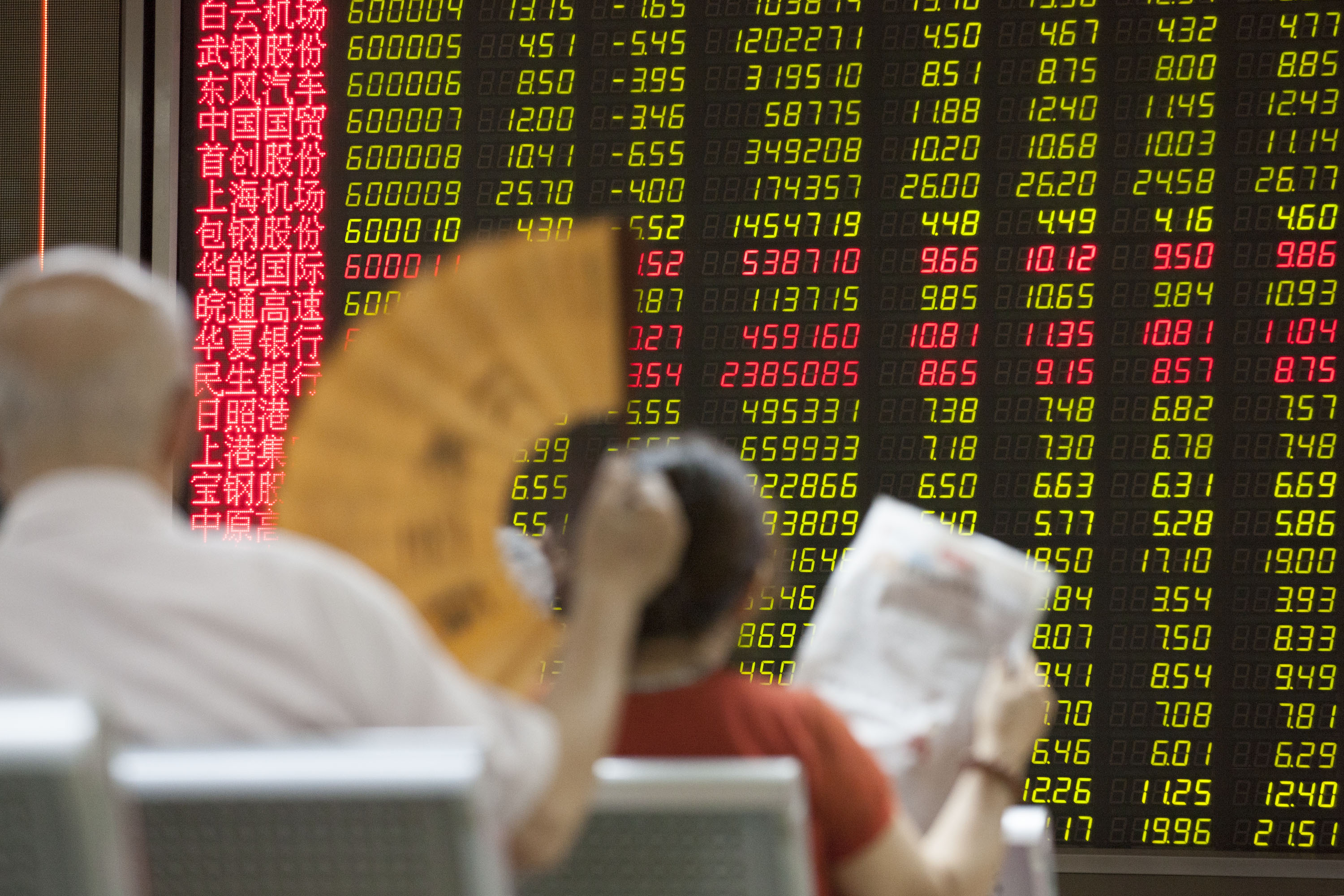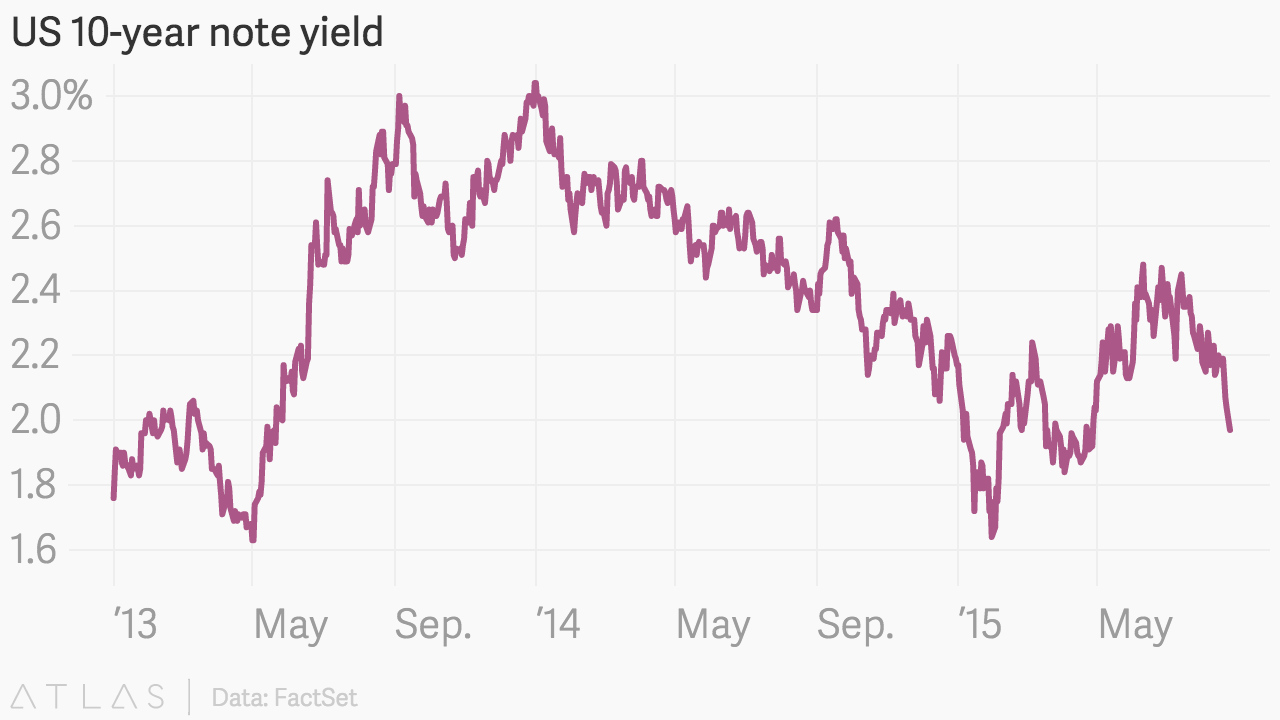How the U.S. can take advantage of China's stock market crash
With investors plowing their money into U.S. Treasuries, this would be a good time to start spending


A free daily email with the biggest news stories of the day – and the best features from TheWeek.com
You are now subscribed
Your newsletter sign-up was successful
The worries about China's economy continued to grow this week, sending shock waves across stock markets in the rest of Asia, Europe, and America. The Dow Jones fell more than 1,000 points Monday morning, and was still down 600 points by the closing bell. It was so dicey that former U.S. Treasury Secretary Larry Summers tweeted that, like in August of 2008, "we could be in the early stage of a very serious situation."
Now, while few people can boast economic know-how as impressive as Summers, it's still very hard to see how things could get that bad. China was clearly in the midst of a stock bubble that had to burst sooner or later. And when you do the math, it would require an incredibly catastrophic turn in the fortunes of China's real economy to do significant damage to the U.S.
That said, Monday was certainly a bit unnerving. So it's worth mentioning that, if we'd like to hedge our bets anyway, and do something to shore up the U.S. financial markets and the underlying U.S. economy at the same time, there's a very simple policy our government could enact to kill both birds with one stone: Borrow lots of money.
The Week
Escape your echo chamber. Get the facts behind the news, plus analysis from multiple perspectives.

Sign up for The Week's Free Newsletters
From our morning news briefing to a weekly Good News Newsletter, get the best of The Week delivered directly to your inbox.
From our morning news briefing to a weekly Good News Newsletter, get the best of The Week delivered directly to your inbox.
Whenever you have a financial market panic like this, people are selling off any assets they think are risky — ones that are dropping, or may drop, in price. Then investors go looking for assets that are as safe and stable as possible to park their money in. And that usually means U.S. Treasury bonds, which are the vehicle through which the government borrows money.
The price of U.S. bonds is determined by their supply versus the demand. Then there's the yield on the bonds, which is effectively the interest rate. It moves inversely with their price — when bond prices are high, yields are low.
So take a look at the nosedive yields on the standard U.S. treasury bond have taken lately:

(Graph courtesy of Quartz, data from FactSet.)
A free daily email with the biggest news stories of the day – and the best features from TheWeek.com
As it happens, those two troughs since 2013, where the yield fell below 2 percent, are the only times it's done that in at least the last five decades. In short, the price the markets are putting on U.S. debt shot up in response to the China-induced turmoil, and it is isn't too far from being as high as it's ever been.
Given the spending cuts the Republicans have managed to force on Washington, and the subsequent drop in U.S. deficit spending, it's not like the government is going out of its way to goose the supply of bonds. So what you're seeing is a big run-up in the market's demand for U.S. bonds instead.
Now, according to Econ 101, the way economic actors should react to increased demand for something is by producing more of it. That's the whole point of price signals: If demand goes up, but supply doesn't, the price goes up. That induces people to produce more supply of whatever's being demanded, in the hope of making a profit. Obviously, the U.S. government isn't a for-profit enterprise, but it still likes getting funds with which it can do stuff — lord knows politicians don't object to free money — so the basic concept remains the same.
In short, if you take market signals seriously, the government should be responding to all that demand by taking on lots more debt.
There's the question of what we should do with the money if the government were ever to take this advice. Summers is a big fan of more infrastructure spending. The reasons for this should be obvious: While the quality of U.S. infrastructure appears to be headed up, it's still not good. Upgrading the physical systems our economy depends on to function — roads, pipes, wires, internet, ports, trains, buses, light rail, the grid, and more — would increase the economy's resiliency in the face of a shock. And all that refurbishing and new construction is a good source of jobs, especially for the working class.
Another even simpler thing we could do is just bulk up the programs we use to provide aid to the poorest Americans: food stamps, welfare, unemployment benefits, the earned income tax credit, etc. These programs put money directly into the hands of people who need it the most, and thus are the most likely to turn right around and spend it. That spending creates demand for goods and services in the economy, which in turn incentivizes businesses to tap into that demand by upping their operations and hiring new workers. Along with infrastructure spending, these programs have the highest multipliers — the amount of economic activity generated per dollar spent — of any U.S. government program. They serve as a set of natural correctives and shock absorbers whenever the economy goes into the ditch.
What all this should make clear is that it's really horribly misguided to think of the U.S. government as an entity equivalent to a family or a small business — i.e. that it needs to pay its debts off, and it needs to "tighten its belt" when the economy worsens. The government is actually a kind of central ballast tank for the rest of the economy — when there's a downturn, "tightening its belt" is exactly what it shouldn't do.
Moreover, the market gives us clues as to when this ballast tank should be put to use: when demand for U.S. debt has gone up, and yields and interest rates are low. Then the borrowed money can be plowed back into the economy through infrastructure and safety net spending, alleviating and even reversing the very economic crunches that send the financial markets scrambling for the safe harbor of U.S. bonds in the first place. Organizing these sorts of natural flows and corrections is, after all, exactly what price signals in market capitalism were invented to do.
Now if only policymakers would listen.
Jeff Spross was the economics and business correspondent at TheWeek.com. He was previously a reporter at ThinkProgress.
-
 The mystery of flight MH370
The mystery of flight MH370The Explainer In 2014, the passenger plane vanished without trace. Twelve years on, a new operation is under way to find the wreckage of the doomed airliner
-
 5 royally funny cartoons about the former prince Andrew’s arrest
5 royally funny cartoons about the former prince Andrew’s arrestCartoons Artists take on falling from grace, kingly manners, and more
-
 The identical twins derailing a French murder trial
The identical twins derailing a French murder trialUnder The Radar Police are unable to tell which suspect’s DNA is on the weapon
